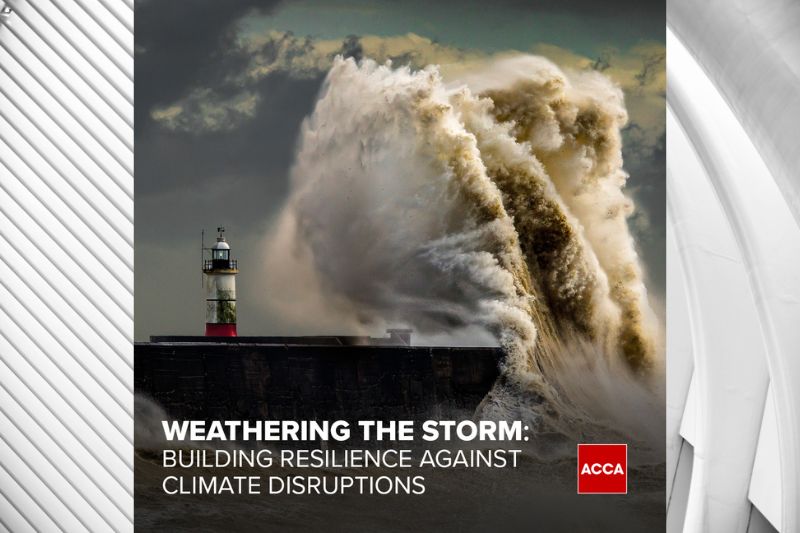Businesses worldwide are underprepared for climate-related disasters, with outdated business continuity plans failing to address the rising frequency and severity of such disruptions. This stark reality is revealed in ACCA’s latest report, ‘Weathering the Storm: Building Resilience Against Climate Disruptions’.
Only 20% of businesses prepared for climate disasters: ACCA report highlights lessons for Malaysia
The report uncovers alarming gaps in preparedness, with only 20 per cent of surveyed businesses identifying climate-related risks across their operations. Even more concerning, just 17 per cent rehearse their responses to major disruptions, while 25 per cent have no mechanisms in place to build resilience.
“Spain’s recent floods and intensifying hurricanes worldwide are harrowing reminders that climate change is not a distant threat; it’s reshaping lives and communities right now,” said report author Emmeline Skelton, Head of Sustainability at ACCA. “Organisations must make climate adaptation a priority— not only to safeguard their operations but to protect the people and places at risk. Rising temperatures, more intense rainfall, and swelling sea levels make the evidence unmistakable: we must act now to build resilience and mitigate further harm.”
“The escalating environmental threats demand comprehensive preparation measures. Yet our survey reveals that climate adaptation planning is still not receiving the urgent attention it requires. It’s time for organisations to take decisive action to protect both their future and the communities they serve,”
These findings serve as a critical lesson for businesses in Malaysia, where climate-related disruptions such as seasonal floods, landslides, and extreme heat are becoming more frequent. While the report highlights global insights, Malaysia can draw valuable lessons in adopting robust climate risk assessment frameworks and building organisational resilience.
Bridging the preparedness gap
Globally, two-thirds of organisations are not investing sufficiently to address the physical risks posed by climate change, with only 37 per cent planning to increase spending on resilience. The report also emphasises the importance of supporting remote workforces in managing climate risks, including power outages and health concerns, which resonate with the Malaysian experience of frequent electricity disruptions during natural disasters.
“Organisations with a digital-first approach can’t overlook climate risks affecting their remote workforce,” added Skelton. “To ensure resilience, forward-thinking organisations need to proactively support remote workers with measures like power backups and health monitoring to stay prepared in an increasingly unpredictable climate.”
Data for the report came from ACCA Global Economic Conditions Survey of over 600 finance professionals worldwide and illustrates these concerns vividly. Power outages topped the list of climate-related disruptions in Africa (54 per cent of respondents), while North America’s leading worries included supply chain breakdowns (41 per cent) and employee health issues (39 per cent).
A Malaysian perspective
Adding to this, Sharath Martin, Senior Policy Manager – Asia Pacific at ACCA, said: “In Malaysia, where our economy is heavily dependent on sectors like agriculture, manufacturing, and tourism, climate resilience must be an urgent priority. Businesses need to recognise that their ability to adapt and thrive amid climate disruptions will determine their survival and the well-being of the communities they operate in. By leveraging tools and strategies outlined in this report, Malaysian organisations can proactively safeguard their operations and contribute to a sustainable future.”
Finance professionals as climate resilience champions
The report highlights the pivotal role of CFOs and finance teams in driving climate resilience through risk based planning and sustainable business strategies. By championing transparency in emissions targets and transition plans, finance professionals are critical to reducing carbon footprints and advancing net zero goals.
This is particularly relevant for Malaysian businesses striving to comply with sustainability-linked financial instruments and regulatory frameworks such as Bursa Malaysia’s sustainability reporting requirements. With the adoption of these global best practices, finance teams in Malaysia can lead the way in creating a fair, inclusive, and climate-resilient future.
Tools for resilience
ACCA’s report includes toolkits to equip finance teams with skills in scenario testing, crisis management planning, and business continuity strategies These practical resources can be instrumental in helping Malaysian businesses navigate disruptions and protect their operations.
“Climate adaptation planning must become a priority across all sectors,” Skelton urged. “Building resilience is not just about ensuring organisational survival—it’s about securing the future of our communities and economies.”
ACCA presented the report’s findings at the recent COP29 climate summit in Azerbaijan, alongside other research and guidance on sustainability issues.
The full report and resources are available at ACCA’s website:
https://www.accaglobal.com/gb/en/professional-insights/global-profession/climate-disruptions.html
#ClimateResilience #ACCAReport #BusinessContinuity #ClimateAdaptation #FinanceProfessionals #Sustainability #RiskAssessment #OrganisationalSurvival #MalaysianBusiness


